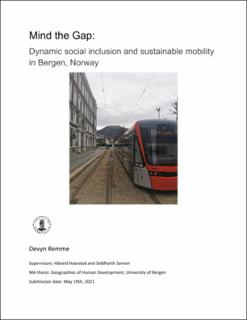Mind the Gap: Dynamic social inclusion and sustainable mobility in Bergen, Norway
Master thesis
Permanent lenke
https://hdl.handle.net/11250/2760716Utgivelsesdato
2021-05-19Metadata
Vis full innførselSamlinger
- Master theses [140]
Sammendrag
Scholars have claimed that regimes of urban automobility have reached their functional and ideological limits. Many cities are pursuing policies to restrict private vehicle use and prioritize walking, cycling and public transportation. De-centering automobility represents a prominent push to change resource intensive social practices and shift representations of ‘the good life’ in cities towards the low carbon logics of shared resources. Yet, as the policies seem to be working and policy makers seek to step them up, the celebratory proclamations of anti-car advocates are dampened by growing resistance and claims of social exclusion. Hence, it is imperative to account for transitions away from automobility as arenas of conflict over values. I present research from Bergen, Norway – a city with a strong commitment to reducing the use of private vehicles. The aim of this thesis is to reflect on the systemic parameters of social inclusion in the context of these mobility transitions in Bergen and to describe the challenges of applying these insights in practice. I consider social inclusion in the context of shifting norms, practices and provision towards a common urban mobility system. Through multiple qualitative methods, I analyze three interventions aimed at reducing private vehicles: light rail expansion, congestion tolls and car free zones. These interventions have been contested by a new populist protest party that claims they cause social exclusion and disproportionately impact those who have the least. The research foregrounds the challenges of reconciling multiple aspects of social inclusion within urban transformation by applying a ‘commoning’ approach. Broadly, commoning refers to processes and conditions which support sharing resources and resist privatization and enclosure. This approach critically engages with the strong normative tradition of liberal distributive justice which prioritizes the value of individual choice and safety net solutions over structural changes. I introduce the term ‘dynamic social inclusion’ and describe it through a discussion of three conceptual areas related to mobility: access, imaginaries of space, time and social change, and the politics of commoning mobility. I find that different inclusion goals are in tension and identify fundamental constraints and trade-offs that policy makers and planners face with regard to social inclusion and mobility transitions.
